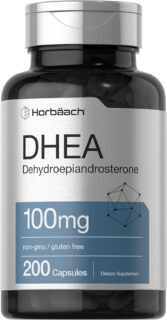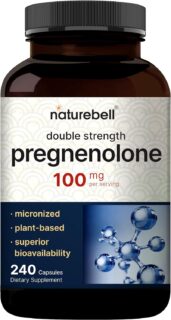Hormonal health is a vital aspect of healthy bodily functioning. After all, the endocrine system is responsible for regulating hormones that help with growth, sleep, metabolism, and hunger, so any disruption to your hormones can increase the risk for many issues.
With estrogen being the most dominant hormone in the female body, it often undergoes many fluctuations, which can influence health in many ways. Taking to Instagram, biohacker, health consultant and New York Times bestselling author Ben Greenfield shared a video of himself and his wife discussing estrogen imbalance and the steps needed to counter this imbalance.
What Causes Hormonal Imbalance?
There are a few factors that can lead to estrogen imbalance, with Greenfield listing toxic personal care products and household cleaning chemicals and the consumption of microplastics as one of the major ones. Additional factors include:
- Poor sleep
- Poor diet
- Gut issues
- Being overweight or obese
- Chronic stress
- Chronic inflammation
An estrogen imbalance can then lead to issues such as insomnia, anxiety, low sex drive, headache, constipation, mood swings, and weight fluctuations, all of which affect quality of life. With that said, Greenfield shares 4 ways in which one can better manage their health and regulate their estrogen levels.
Ben Greenfield’s 6 Tips To Balancing Estrogen Levels
1. Progesterone
Progesterone is a female hormone that supports menstrual health, and a healthy pregnancy. Experts have found that low progesterone levels compared to estrogen may cause an estrogen imbalance; therefore, it is advisable to maintain healthy progesterone levels.
“A lot of women as they age experience an excess of estrogen because their progesterone is low compared to their estrogen,” says Greenfield.
He adds that his wife, Jessa, has been supplementing with topical (transdermal) progesterone, and it’s been part of her hormone health regimen. Jessa also shared that she only takes topical progesterone after ovulation.
By supplementing with progesterone, Greenfield shared that Jessa has experienced improvements in sleep, stress, and a healthy libido.
Having said that, topical progesterone has been linked to side effects like headaches, irregular menstrual cycles and an increased risk for breast cancer. Therefore, it’s advisable to consult your healthcare practitioner for an opinion before turning to a progesterone cream.
2. DHEA
DHEA (Dehydroepiandrosterone) is a hormone produced by the body that’s used to make androgen and estrogen – the male and female hormones. Like many things that come with age, DHEA levels decline, leaving us with one-tenth to one-twentieth of what can be found in a young adult.
This is another hormone that Greenfield recommends that you add to your estrogen-balancing plans. Aside from causing potential estrogen imbalance, low levels of DHEA have been associated with osteoporosis, heart disease, and breast cancer. Now, while DHEA may help to increase estrogen in the body, it does have side effects, so it’s advisable to, once again, consult a health practitioner before taking DHEA.
3. Pregnenolone
Similar to DHEA, pregnenolone is naturally present in the body and aids in the production of steroid hormones. It plays a key role in producing other steroid hormones, including progesterone, DHEA, and estrogen. Because of this, pregnenolone is known as the ‘mother of hormones’.
Aside from its impact on hormones, researchers have also found that pregnenolone promotes memory and learning, and alleviates symptoms of depression. Nonetheless, pregnenolone is still a supplement so, once again, always consult a healthcare professional before adding supplements to your routine, especially those that can influence hormones.
4. Weight lifting
Exercise is great for the mind, body, soul – and estrogen.
Lifting weights, in particular, can help regulate estrogen levels by increasing muscle mass,
“This increases metabolism, which then helps to burn more fat and reduce fat mass,” explains Alicia Stanton, MD, to Oxygen, “In turn, this reduces the amount of aromatase — the result of fewer fat cells. So more testosterone is available and less estrogen is produced. Since testosterone also helps you build lean muscle mass and reduce fat mass, the results of exercise are further improved.”
Despite its benefits, weight lighting can weaken your pelvic floor, so it is advisable to incorporate exercises that can strengthen your pelvic floor, such as these.
5. De-stressing
Stress is normal, but chaos starts when it becomes chronic, as this causes elevated levels of the stress hormone cortisol. Elevated levels of this cortisol throws other hormones, including estrogen, into disarray.
With that, it would be best to adopt stress-relieving exercises such as yoga, mindfulness, gardening, journaling, and reading.
6. Adequate Sleep
Are you getting enough quality sleep? If not, then you may be struggling with low estrogen levels.
According to one study, middle-aged women with low levels of estrogen and progesterone were more likely to snore and experience obstructive sleep apnea.
If you want to regulate your estrogen levels, and get at least 8 hours of quality sleep per night, then might I recommend essential oils or adopting a new bedtime routine?
Want to know more?
Fasting of all kinds is doing its trendy rounds in the wellness industry. But doing it too soon – and in the wrong way – has its setbacks, especially for women. In fact, here’s how fasting can work against your hormones.
Read more about endocrine disruptors and how they impact your health here: Endocrine Disruptors: Avoid These 8 To Protect Your Hormones
References
Barbiero, I., Bianchi, M., & Kilstrup-Nielsen, C. (2022). Therapeutic potential of pregnenolone and pregnenolone methyl ether on depressive and CDKL5 deficiency disorders: Focus on microtubule targeting. Journal of Neuroendocrinology, 34(2), e13033. https://doi.org/10.1111/jne.13033
Jethwani P, Rastogi A, Shukla R. Dehydroepiandrosterone sulfate supplementation in health and diseases. World J Meta-Anal 2023; 11(4): 102-111 [DOI: 10.13105/wjma.v11.i4.102]
Khan, S.A. (2020). Progesterone Exposure and Breast Cancer Risk—Addressing Barriers. JAMA Network Open, 3(4), p.e203608. doi:https://doi.org/10.1001/jamanetworkopen.2020.3608
Ramírez, S., Haddad-Tóvolli, R., Radosevic, M., Toledo, M., et al. (2022). Hypothalamic pregnenolone mediates recognition memory in the context of metabolic disorders. Cell Metabolism, 34(2), 269-284. https://doi.org/10.1016/j.cmet.2021.12.023
Sigurðardóttir, E. S., Gislason, T., Benediktsdottir, B., Hustad, S., et al. (2022). Female sex hormones and symptoms of obstructive sleep apnea in European women of a population-based cohort. PLOS ONE, 17(6), e0269569. https://doi.org/10.1371/journal.pone.0269569
The Oxygen Team. (2017). Estrogen and Weight Training. [online] Oxygen Mag. Available at: https://www.oxygenmag.com/life/womens-health/estrogen-weight-training-11704/
Quester, J., Nethander, M., Eriksson, A., & Ohlsson, C. (2022). Endogenous DHEAS Is Causally Linked With Lumbar Spine Bone Mineral Density and Forearm Fractures in Women. The Journal of Clinical Endocrinology & Metabolism, 107(5), e2080-e2086. https://doi.org/10.1210/clinem/dgab915





![women [longevity live]](https://longevitylive.com/wp-content/uploads/2020/01/photo-of-women-walking-down-the-street-1116984-100x100.jpg)










